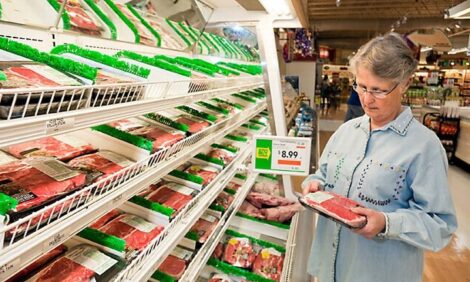



Colorado producers to phase-out gestation crates
US - Colorado pork producers have decided to phase-out sow gestation crates over the next 10 years, writes Peter Shinn.
According to Colorado Pork Producers Council (CPPC) Executive Director Ivan Steinke, the move comes as the result of meetings with consumers this fall and in response to "changing market conditions."
In a press release, Steinke noted sow gestation crates are "the industry standard" and are used to help maintain the health of pregnant sows. Nevertheless, Steinke says Colorado pork producers are ending the use of gestation crates in response to public concerns.
"Colorado's pork producers will embark on a 10-year phase-in that will allow producers to thoroughly evaluate and determine the best animal welfare practices for group housing," Steinke said in the release. Bal
lot initiatives in Florida and Arizona banned sow gestation crates in 2002 and 2006, respectively. Shortly after the Arizona ballot initiative passed, Smithfield Foods, the nation's largest pork producer, announced it would phase-out sow gestation crates over the next decade. An Oregon law banning sow gestation crates after a six-year phase-out took effect in January of this year. But neither Florida, Arizona nor Oregon had a large pork industry. Colorado, in contrast, is the nation's 15th leading state for pork production.
The Colorado pork industry’s move didn’t fully satisfy animal rights extremists. Wayne Pacelle, a vegan who heads the Human Society of the US, praised the decision to phase out sow gestation crates in Colorado by 2018. But he said Colorado livestock producers had to do more. In a statement, Pacelle said Colorado egg producers should eliminate chicken cages as well.
"Approximately 3.8 million egg-laying hens in Colorado are confined in barren, wire, battery cages, in which each bird has less space than a single sheet of paper to live her entire life," the Pacelle statement claimed. "Egg producers should make a similar commitment, given that these two confinement systems raise the same basic moral issues."
Source: Brownfield
In a press release, Steinke noted sow gestation crates are "the industry standard" and are used to help maintain the health of pregnant sows. Nevertheless, Steinke says Colorado pork producers are ending the use of gestation crates in response to public concerns.
"Colorado's pork producers will embark on a 10-year phase-in that will allow producers to thoroughly evaluate and determine the best animal welfare practices for group housing," Steinke said in the release. Bal
lot initiatives in Florida and Arizona banned sow gestation crates in 2002 and 2006, respectively. Shortly after the Arizona ballot initiative passed, Smithfield Foods, the nation's largest pork producer, announced it would phase-out sow gestation crates over the next decade. An Oregon law banning sow gestation crates after a six-year phase-out took effect in January of this year. But neither Florida, Arizona nor Oregon had a large pork industry. Colorado, in contrast, is the nation's 15th leading state for pork production.
The Colorado pork industry’s move didn’t fully satisfy animal rights extremists. Wayne Pacelle, a vegan who heads the Human Society of the US, praised the decision to phase out sow gestation crates in Colorado by 2018. But he said Colorado livestock producers had to do more. In a statement, Pacelle said Colorado egg producers should eliminate chicken cages as well.
"Approximately 3.8 million egg-laying hens in Colorado are confined in barren, wire, battery cages, in which each bird has less space than a single sheet of paper to live her entire life," the Pacelle statement claimed. "Egg producers should make a similar commitment, given that these two confinement systems raise the same basic moral issues."
Source: Brownfield








